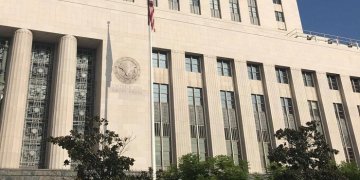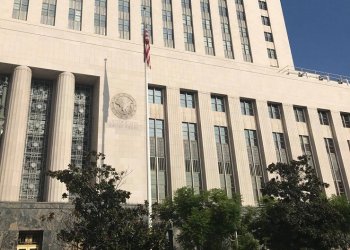The term “Airbnb” did not exist a decade ago. Today, the name of the short-term accommodation company is so popular that it has become a blanket term for the industry as a whole, much in the same way “Google” has become a phrase to describe any form of online search. In recognition of the increasing prevalence of short-term rentals (STRs), Los Angeles lawmakers are looking to regulate this burgeoning industry.
An STR is a rental lasting less than 30 days. There are approximately 29,000 STR listings within the City of Los Angeles, according to the Department of City Planning. STR activity, while occurring throughout the City, is highly concentrated in a small number of neighborhoods. These include Venice, Hollywood, Los Feliz and Echo Park. According to City Planning, Venice has the highest concentration of STR activity.
“The highest concentration appears to be in Venice, which now has approximately 1,600 entire home Airbnb listings,” stated the Department in a report to the City Council Planning and Land Use Management (PLUM) Committee.
The City has been attempting to regulate this industry since 2010, and on April 10, made significant progress in accomplishing this goal when the PLUM Committee approved City Planning policy recommendations that limit STRs to primary residences while capping the amount of time hosts can rent out their homes to 120-nights a year.
“[This] ensures that STR activity remains an accessory of the building and not its primary use,” City Planning wrote in their report.
Hosts will, however, be able to operate beyond the 120-night annual cap if they meet certain requirements. These include having received no objections from neighboring owners within 100 feet of the location and having not been the subject of an enforced nuisance violation during the last three years. This process to operate beyond the cap came after the City received negative feedback from homeowners who rely on home sharing for an income.
“The committee’s vote last week is a step in the right direction, allowing thousands of Angelenos to use what is often their biggest expense – their homes – to earn critical extra income by sharing their home year round,” Airbnb told Yo! Venice. “With more and more Angelenos relying on home sharing to stay where they live, we want to make sure that this process remains affordable and easy for hosts to navigate.”
The attempt to limit STR activity is in part a response to the shortage of affordable housing within the City. For a landlord, renting out a unit as an STR is more lucrative than renting out that unit as affordable housing.
“It is possible that 44 percent of current STR units are RSO [Rent Stabilization Ordinance] units,” City Planning said in their report. “There is considerable overlap between areas with high levels of Airbnb activity and evictions.”
According to Councilmember Mike Bonin, the current proposal aims to decrease the number of affordable housing units being used for STRs, while not infringing on residents who rely on home sharing as a living.
“Our Planning and Land Use Committee approved a balanced framework for an ordinance that will allow hosts to provide genuine home sharing in their primary residence only, while preventing rogue operators of bootleg hotels from eliminating our needed rental housing and worsening our affordable housing crisis,” Bonin said. “The compromise legislation, coupled with enforcement provisions, will help protect affordable housing while still allowing good home sharing.”
Ed Colman, a Venice resident who rents out a guest room in his house for most of the year on Airbnb, told Yo! Venice that he is glad the City is restricting STR activity to primary residences but is worried about the attempt to create a 120-night annual cap. Colman, who retired after the post-production company he worked for downsized, relies on the income he earns from renting out his guest room and is wary of the City attempting to regulate his livelihood.
“I think the least they involve themselves in my personal affairs, in my personal property, is the best for me,” Colman said. “How many businesses do you know where they say ‘you can only operate your business six-months out of the year’?”
Some in Venice want the City to ban all forms of STR activity over concerns that the practice disrupts the community.
“The Airbnb situation is radically changing our neighborhoods,” Martha Hertzberg, a longtime Venice resident wrote in a letter to City Council. “Next door we have strangers coming and going constantly in our shared side yard…we want real neighbors.”
Colman, however, disagrees with the notion that STRs disrupt the community, arguing that any homeowner renting out a room in their house is going to make sure that the guests are not disruptive. Furthermore, he says that STR hosts can actually give back to the community by telling guests to support local businesses.
“We send people out into the community, we help put money into our community directly whereas if you spend money in a hotel, it does not go back into someone’s pocket, it goes to Conrad Hilton’s pocket or J.W. Marriott’s pocket,” Colman said.
While the PLUM Committee made significant progress when they approved the City Planning policy recommendations, the ordinance still has to be voted on by the City Council as a whole, and there remain many unanswered questions. To begin with, there is some uncertainty regarding how the City is going to enforce these rules in a cost-effective fashion. Furthermore, it is unclear how the City is going to account for the roughly $15.5 million of Transient Occupancy Tax revenue the City Administrative Officer estimates the City will lose annually under this proposed ordinance. And while there will likely be lively debate around these decisions, not all stakeholders are convinced butting-heads is the best way to come up with a sound plan.
“I hate that it has been framed as a battle,” Colman said. “Because it is really not ‘us’ versus ‘them’, we are all in it together.”





















